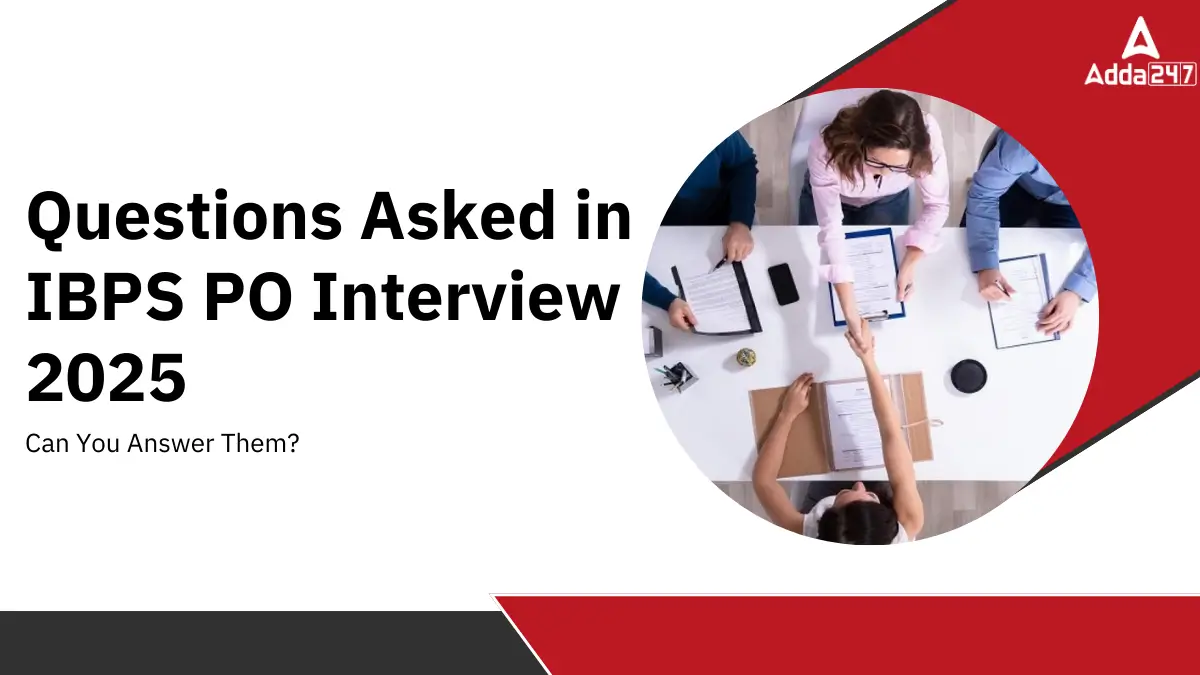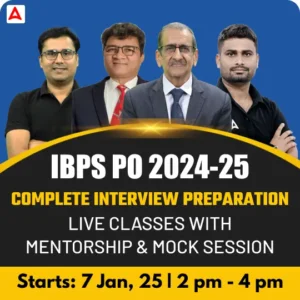Table of Contents
The IBPS PO interview is known for its blend of general and professional questions, designed to assess both your personality and technical intellect. In 2025, candidates have experienced a wide variety of questions that not only evaluate their understanding of banking operations but also their overall communication skills and general awareness. This article categorizes these questions into two broad sections – General Questions and Professional Questions – to help you prepare and understand what to expect.
Questions Asked in IBPS PO Interview 2025
The IBPS PO interview in 2025 has been a blend of personal and professional inquiries, and your ability to confidently answer these questions will significantly boost your chances of success.
General Questions
General questions are aimed at gauging your personality, background, and general awareness. They help the panel understand your communication style and whether you’d be a good fit for the bank’s culture. Here are some examples:
Family and Background:
“Family ke bare me bataye.”
“Family me koi banker hai already?”
“What does your mom and dad do?”
“Introduce yourself and tell us about your family background.”
Academic and Personal Journey:
“Graduation kab kiya, college, university name?”
“What were you doing during your gap year?”
“Tell us something about Magadha Empire.”
Personal Preferences and Opinions:
“Why the banking sector after your educational background?”
“What quality a banker should possess from a customer’s perspective?”
“How does your father’s experience (e.g., retired from the army) influence your career choice?”
Location and Current Affairs:
“Delhi se ho?”
“What did your dad advise you to prepare?” (Asked in a friendly manner, eliciting a light-hearted response.)
These questions are designed to make you comfortable and let the interviewers understand your personality, social background, and overall fit for the banking environment.
Professional Questions
Professional questions test your technical knowledge, understanding of banking operations, and current financial scenarios. They require a clear, concise, and informed response. Some of the key professional questions asked include:
Banking and Finance Fundamentals:
“What is a balance sheet?”
“How are deposits, loans, and advances shown in the balance sheet of a bank?”
“What is the capital adequacy ratio?”
“What do you understand by capital risk?”
Financial Markets and Instruments:
“Preference share vs. equity share – explain the differences.”
“What are the various types of shares and the process of company registration?”
“What is your understanding of repo rate, MPC, and the effects of their changes?”
Regulatory and Policy-Related Questions:
“Explain RBI functions, especially the Lender of the Last Resort.”
“What are CRR and SLR, and how do they impact the banking sector?”
“Discuss recent changes in the Companies Act or any significant regulatory update.”
Current Affairs and Economic Policies:
“What are the announcements related to agriculture in the latest budget?”
“How does the strength of a currency affect its value?”
“Discuss major schemes related to financial inclusion.”
Technical and Domain-Specific Questions:
“What is a nostro account?”
“Explain the difference between debit and credit cards.”
“What documents are required for forming a company or a partnership firm?”
These questions require you to stay updated with current financial policies, regulatory changes, and fundamental concepts in banking and finance. They not only test your academic knowledge but also your ability to apply that knowledge in a practical banking context.
Key Takeaways for the IBPS PO Interview Preparation
Balance Your Preparation: Focus on both general and professional areas. While personal questions help build rapport with the interview panel, technical questions validate your industry knowledge.
Practice Clear and Concise Responses: Develop answers that are precise and to the point. Practice speaking confidently and clearly, as effective communication is crucial in interviews.
Stay Updated with Current Affairs: Regularly follow financial news, budget announcements, and regulatory updates to tackle questions on current affairs and policy changes.
Mock Interviews and Feedback: Engage in mock interviews to simulate the actual experience. This will help you identify your strengths and areas for improvement in handling both general and technical questions.




 GA Capsule for SBI Clerk Mains 2025, Dow...
GA Capsule for SBI Clerk Mains 2025, Dow...
 The Hindu Review October 2022: Download ...
The Hindu Review October 2022: Download ...
 Books and Authors Capsule for SBI PO Mai...
Books and Authors Capsule for SBI PO Mai...





